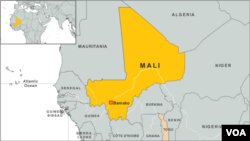DIAGO, MALI —
Malian authorities have found a mass grave believed to contain the bodies of soldiers a week after the ex-junta leader was detained in connection with suspected crimes by the army.
A judicial source said 21 bodies had been found at the site in the village of Diago near the southern garrison town of Kati, about 30 km (19 miles) north of the capital Bamako.
A Reuters reporter at the scene said police were guarding the shallow grave on Wednesday. Diago residents said it was empty after Malian officials removed the corpses on Tuesday.
A week ago, former junta chief General Amadou Sanogo, who led the March 2012 coup that plunged Mali into chaos, was arrested and charged with complicity in kidnapping.
The case against Sanogo is part of efforts by newly elected President Ibrahim Boubacar Keita to assert civilian control over the army, which has been accused by human rights groups of excessive violence and torture during a chaotic 18 months during which rebels occupied northern Mali last year.
“We saw authorities come and exhume the bodies last night,” Yacouba Coulibaly, a Diago resident, told Reuters.
“We told the authorities a long time ago that there was a mass grave here from when soldiers came to bury people here in 2012. The presence of the mass grave was not a secret here in Diago,” Coulibaly said.
A senior military source said authorities had been instructed to inspect the site by judge Yaya Karambe, who is presiding over Sanogo's case as well as those of several other soldiers questioned in an investigation into army crimes.
The main cases are the disappearance of a number of soldiers during a failed April 2012 “counter-coup” by soldiers loyal to ousted President Amadou Toumani Toure and the deaths of soldiers in a mutiny in Kati in September this year.
It was not immediately clear whose bodies were in the mass grave. But the figure of those found matches the number of soldiers, at least 20, that Human Rights Watch said had disappeared after the army in-fighting in April 2012.
Soon after the foiled plot, pro-Toure paratroopers known as “red berets” were denounced on state television as mercenaries.
After ceding power to an interim civilian administration, Sanogo headed a military committee tasked with reforming Mali's armed forces before being removed in August, shortly after the election of the new president.
The army's implosion allowed Tuareg separatists and Islamist militants linked to al Qaeda to occupy Mali's vast north until they were scattered during a French-led intervention in January.
Attacks in northern Mali in recent weeks highlight the lingering Islamist threat while the depth of the divisions in the army mean Keita will have to push through thorough reforms to revamp the West African state's demoralized military.
A judicial source said 21 bodies had been found at the site in the village of Diago near the southern garrison town of Kati, about 30 km (19 miles) north of the capital Bamako.
A Reuters reporter at the scene said police were guarding the shallow grave on Wednesday. Diago residents said it was empty after Malian officials removed the corpses on Tuesday.
A week ago, former junta chief General Amadou Sanogo, who led the March 2012 coup that plunged Mali into chaos, was arrested and charged with complicity in kidnapping.
The case against Sanogo is part of efforts by newly elected President Ibrahim Boubacar Keita to assert civilian control over the army, which has been accused by human rights groups of excessive violence and torture during a chaotic 18 months during which rebels occupied northern Mali last year.
“We saw authorities come and exhume the bodies last night,” Yacouba Coulibaly, a Diago resident, told Reuters.
“We told the authorities a long time ago that there was a mass grave here from when soldiers came to bury people here in 2012. The presence of the mass grave was not a secret here in Diago,” Coulibaly said.
A senior military source said authorities had been instructed to inspect the site by judge Yaya Karambe, who is presiding over Sanogo's case as well as those of several other soldiers questioned in an investigation into army crimes.
The main cases are the disappearance of a number of soldiers during a failed April 2012 “counter-coup” by soldiers loyal to ousted President Amadou Toumani Toure and the deaths of soldiers in a mutiny in Kati in September this year.
It was not immediately clear whose bodies were in the mass grave. But the figure of those found matches the number of soldiers, at least 20, that Human Rights Watch said had disappeared after the army in-fighting in April 2012.
Soon after the foiled plot, pro-Toure paratroopers known as “red berets” were denounced on state television as mercenaries.
After ceding power to an interim civilian administration, Sanogo headed a military committee tasked with reforming Mali's armed forces before being removed in August, shortly after the election of the new president.
The army's implosion allowed Tuareg separatists and Islamist militants linked to al Qaeda to occupy Mali's vast north until they were scattered during a French-led intervention in January.
Attacks in northern Mali in recent weeks highlight the lingering Islamist threat while the depth of the divisions in the army mean Keita will have to push through thorough reforms to revamp the West African state's demoralized military.





